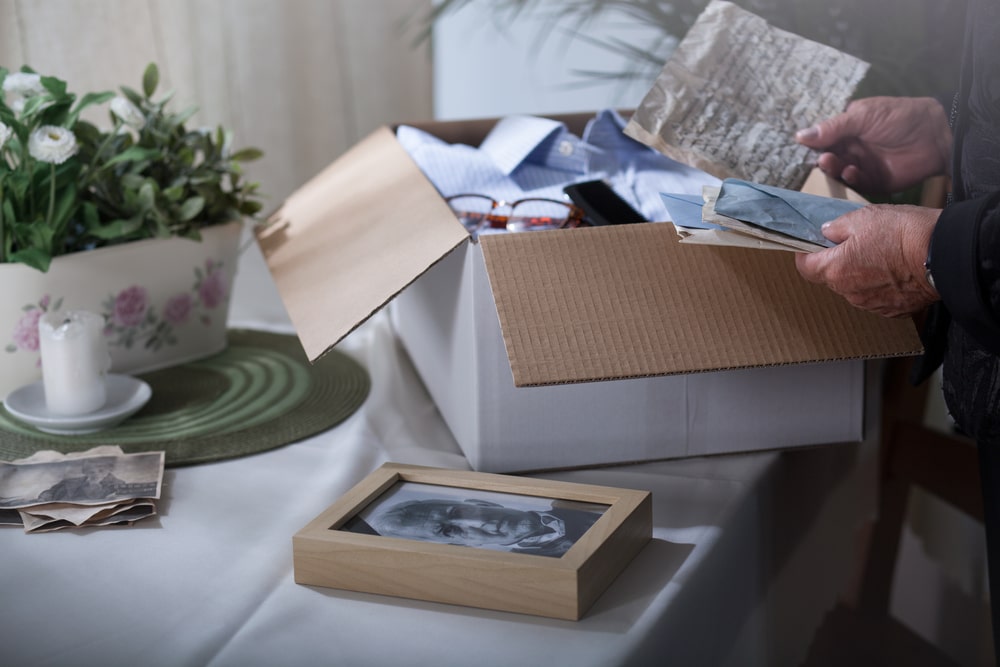


If you have lost a loved one, you may dread the day when you have to give away your loved one’s favorite shirt, well-loved books, or old golf balls. Possessions…

Don’t tell me that you understand. Don’t tell me that you know. Don’t tell me that I will survive, How I will surely grow. Don’t come at me with answers…

This story is all too common. A parent dies without a legal will, and the adult children must face not only their grief, but the headache of moving the estate…

If you have lost a loved one, you may dread the day when you have to give away your loved one's favorite shirt, well-loved books, or old golf balls. Possessions are tied to events and memories, and when you come across an item that was part of a loved one's identity, you find yourself in a lose-lose situation: it hurts to keep it and it hurts to part with it.
But there are ways to make the sorting process more bearable. Sorting through a lost loved one's belongings is never easy, but by developing a strategy, you can make it much more tolerable. Here are some tips that might provide you with some peace as you face this daunting task: Start by giving yourself some structure. Diving into such a big project without a plan will leave you overwhelmed and exhausted. There are plenty of ways to create a game plan that works for you. Make a list of what needs to be done and organize your goals. Separate the items you need to clean into groups and move from group to group. Or you could designate each room as a separate job and have an individual strategy for each room.
Start by giving yourself some structure. Diving into such a big project without a plan will leave you overwhelmed and exhausted. There are plenty of ways to create a game plan that works for you. Make a list of what needs to be done and organize your goals. Separate the items you need to clean into groups and move from group to group. Or you could designate each room as a separate job and have an individual strategy for each room.
 After the loss of a loved one, cleaning can be physically and emotionally draining. For this reason, it's important to pace yourself. Completing any task, big or small, can create a sense of satisfaction, so break one task into five and have five moments of victory! Be sure to take plenty of breaks between tasks. Or you can develop a reward system for yourself. You can grab a coffee after finishing a certain closet or take a TV break after finishing a room.
After the loss of a loved one, cleaning can be physically and emotionally draining. For this reason, it's important to pace yourself. Completing any task, big or small, can create a sense of satisfaction, so break one task into five and have five moments of victory! Be sure to take plenty of breaks between tasks. Or you can develop a reward system for yourself. You can grab a coffee after finishing a certain closet or take a TV break after finishing a room.
 You'll cut down on a lot of excess time and energy if you sort the items into piles as you go. You may want to designate areas or boxes labeled "Keep," "Donate," "Give to a family member," and "Throw away." Then, you can place things in the appropriate areas. Sorting items while you're cleaning will help you decide on a clear goal for each item and make the project more manageable.
You'll cut down on a lot of excess time and energy if you sort the items into piles as you go. You may want to designate areas or boxes labeled "Keep," "Donate," "Give to a family member," and "Throw away." Then, you can place things in the appropriate areas. Sorting items while you're cleaning will help you decide on a clear goal for each item and make the project more manageable.
 As you look over your loved one's possessions, you may be tempted to keep too much. So, in addition to setting goals for completing your project, set goals for your ability to let go. You don't have to get rid of everything; however, there is no way you can keep every item that has meaning to you. The best way to decide what to save is to write a short list of items ahead of time that you can't imagine parting with and set specific limitations for each type of item you will keep.
As you look over your loved one's possessions, you may be tempted to keep too much. So, in addition to setting goals for completing your project, set goals for your ability to let go. You don't have to get rid of everything; however, there is no way you can keep every item that has meaning to you. The best way to decide what to save is to write a short list of items ahead of time that you can't imagine parting with and set specific limitations for each type of item you will keep.
 Which items are the most meaningful to you? When you first look at your loved one's possessions, everything seems important. And when you decide which items are most important, how do you know if your loved one would want you to keep them? Determining what to keep and what to part with can be extremely difficult. There are no fixed criteria to help you decide to hold on to item A and let go of item B. It's ultimately up to you to decide. Remember your loved one's connection to the possession and try to determine if you truly need to keep the object. If not, consider donating it.
Which items are the most meaningful to you? When you first look at your loved one's possessions, everything seems important. And when you decide which items are most important, how do you know if your loved one would want you to keep them? Determining what to keep and what to part with can be extremely difficult. There are no fixed criteria to help you decide to hold on to item A and let go of item B. It's ultimately up to you to decide. Remember your loved one's connection to the possession and try to determine if you truly need to keep the object. If not, consider donating it.
 Going through your loved one's possessions can be a daunting task. If you're struggling to tackle the sorting process, you could invite close friends to help out. It's essential to surround yourself with people who can provide emotional support. Your support system can help you make decisions, provide an extra set of hands, and encourage you when things get hard. If you decide this is a personal project you'd rather complete on your own, that's fine, too. Still, consider planning time to be with others during breaks or right before or after sorting. Falling back on a support network can be extremely helpful when facing emotionally difficult tasks.
Going through your loved one's possessions can be a daunting task. If you're struggling to tackle the sorting process, you could invite close friends to help out. It's essential to surround yourself with people who can provide emotional support. Your support system can help you make decisions, provide an extra set of hands, and encourage you when things get hard. If you decide this is a personal project you'd rather complete on your own, that's fine, too. Still, consider planning time to be with others during breaks or right before or after sorting. Falling back on a support network can be extremely helpful when facing emotionally difficult tasks.
 Sorting through your loved one's belongings can put you in an emotionally vulnerable place and can lead to self-doubt. Remember: there is nothing to feel guilty about! Letting some things go is not an act of betrayal. On the contrary, it is a gift to your loved one, a tribute. Maintaining a healthy attitude is key. Know what you are doing is necessary, and view it as one more way to honor the person you love.
Cleaning out a loved one's home or possessions after a loss can be stressful, so go easy on yourself. Remember the importance of what you are doing, and keep a positive mindset. Don't rush through the project, and above all, leave no room for guilt. Love yourself just as you loved the person that you lost. Know that this is a challenging project and that your best effort is more than good enough.
Sorting through your loved one's belongings can put you in an emotionally vulnerable place and can lead to self-doubt. Remember: there is nothing to feel guilty about! Letting some things go is not an act of betrayal. On the contrary, it is a gift to your loved one, a tribute. Maintaining a healthy attitude is key. Know what you are doing is necessary, and view it as one more way to honor the person you love.
Cleaning out a loved one's home or possessions after a loss can be stressful, so go easy on yourself. Remember the importance of what you are doing, and keep a positive mindset. Don't rush through the project, and above all, leave no room for guilt. Love yourself just as you loved the person that you lost. Know that this is a challenging project and that your best effort is more than good enough.

 The issue of intestacy is further complicated by the fact that states have different laws for going about the process. To avoid all the legal red tape, plan ahead by writing a will that clearly delineates your wishes and that is legally valid. Requirements for a will’s legality vary from state to state, so you may have to do some research on specific requirements in your state. However, here are some general guidelines that you can follow to write a will that is legally acceptable and that best conveys your wishes:
The issue of intestacy is further complicated by the fact that states have different laws for going about the process. To avoid all the legal red tape, plan ahead by writing a will that clearly delineates your wishes and that is legally valid. Requirements for a will’s legality vary from state to state, so you may have to do some research on specific requirements in your state. However, here are some general guidelines that you can follow to write a will that is legally acceptable and that best conveys your wishes:
 While these general principles will help you avoid some of the potential pitfalls of will-writing, it is essential that you also educate yourself on your specific state’s laws for creating a will. An attorney can help with this, or you can take advantage of an online will creation service to make sure that your will is written within the parameters of state law.
Be Proactive
It’s never too early to start thinking ahead. By creating a clearly worded and legally sound will, you can relieve your family of unnecessary stress and make sure that your wishes will be carried out. Ensuring that your estate and your belongings are distributed according to your preferences will bring peace of mind to you and your loved ones.
While these general principles will help you avoid some of the potential pitfalls of will-writing, it is essential that you also educate yourself on your specific state’s laws for creating a will. An attorney can help with this, or you can take advantage of an online will creation service to make sure that your will is written within the parameters of state law.
Be Proactive
It’s never too early to start thinking ahead. By creating a clearly worded and legally sound will, you can relieve your family of unnecessary stress and make sure that your wishes will be carried out. Ensuring that your estate and your belongings are distributed according to your preferences will bring peace of mind to you and your loved ones.